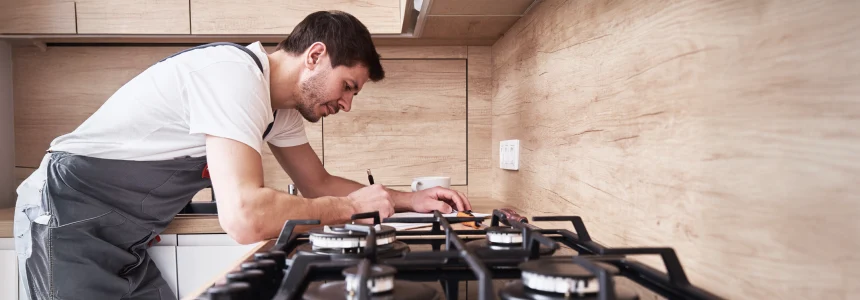
Contemplating coverage?
Subscribe to receive our emails & get
$200 OFF!
Have questions?
Call us: (833) 544-8273


Written By Rachel Cherem
Many homeowners prefer gas stoves to electric because gas appliances tend to be more responsive and offer greater heat control. Those advantages begin to erode, though, if you don’t adequately maintain your gas stove with routine cleaning and servicing. Luckily, keeping a gas stove in great condition is not overly complicated.
A poorly maintained gas stove can introduce otherwise avoidable safety hazards into your home, and the absence of regular upkeep renders the appliance much less efficient over time. Let’s examine why maintenance is so critical.
Keeping your gas stove’s burners at optimal efficiency is a matter of clean burner ports and properly fitted components. Follow these gas stove maintenance tips to ensure superior flame quality:
While you should wipe down your stove and monitor the flame quality whenever you cook, there are other gas stove burner maintenance tasks you can incorporate into your seasonal checklists. Performing these tasks at least four times per year will keep your stove in excellent shape:
Regardless of any issues you might be experiencing with your gas stove, you should call a professional to schedule an inspection at least once per year. Here are some other signs that your gas stove needs professional care:
As a word of caution, if you suspect a gas leak or carbon monoxide problem, evacuate your home immediately. Don’t stop to open the windows. Get your family and pets outside as soon as possible and call emergency services to have the problem checked out.
Preventive maintenance helps you get the most out of your stove, but it doesn’t ward off the possibility of malfunction entirely. Stoves take a beating from everyday cooking, and you’ll more than likely need to replace one component or another at some point to keep the appliance working efficiently. When that day comes, you can protect yourself from the out-of-pocket repair expense by using your home warranty coverage. Stove care is a standard part of Liberty Home Guard’s warranty packages, and we’ll make sure your appliance problems are handled quickly, affordably, and with an expert’s touch. Find your coverage by calling (833)-545-3434.
There’s a reason Liberty Home Guard was rated the #1 Home Warranty Service by U.S. News and World Report for 2021, 2022, 2023, and 2024. Check out our services.
Learn MoreAim to schedule professional gas stove maintenance services at least once a year. A certified technician can perform a thorough safety and efficiency inspection and identify problems sooner than the average homeowner typically can.
Warm, soapy water is usually all you need to properly clean the burners on a gas stove. You can use a little vinegar for stubborn residue, but avoid harsh industrial cleaners, which can damage the stove’s component parts and leave behind a residue you don’t want in proximity to your food. Use sponges, rags, or paper towels to clean your stove and avoid steel wool and other abrasive tools.
Trust your senses to help you identify a gas leak. If you smell gas or hear hissing, contact a professional to get the problem checked out. Alternatively, you can apply soapy water to your stove’s gas fittings and connections. If you see the soap bubbling up, there is likely a leak.
Generally, you should use soap and water or other gentle cleaning solutions to wipe down your stovetop, but in some circumstances commercial cleaners may be appropriate. Just be sure to follow the guidelines outlined in your owner’s manual and on the cleaner label.
Routine stovetop cleanings don’t require elaborate prep. Simply make sure the burners are turned off and remain off during cleaning. It’s best to leave anything related to the gas lines to the pros, but if you suspect a gas leak or plan to adjust any of the gas fittings or connections, consider turning off the gas at the source and opening your kitchen windows for adequate ventilation.
Stay Ahead of Potential
Home Mishaps!
Subscribe to our Liberty Home Guard Newsletter and gain access to exclusive content that ensures your peace of mind.